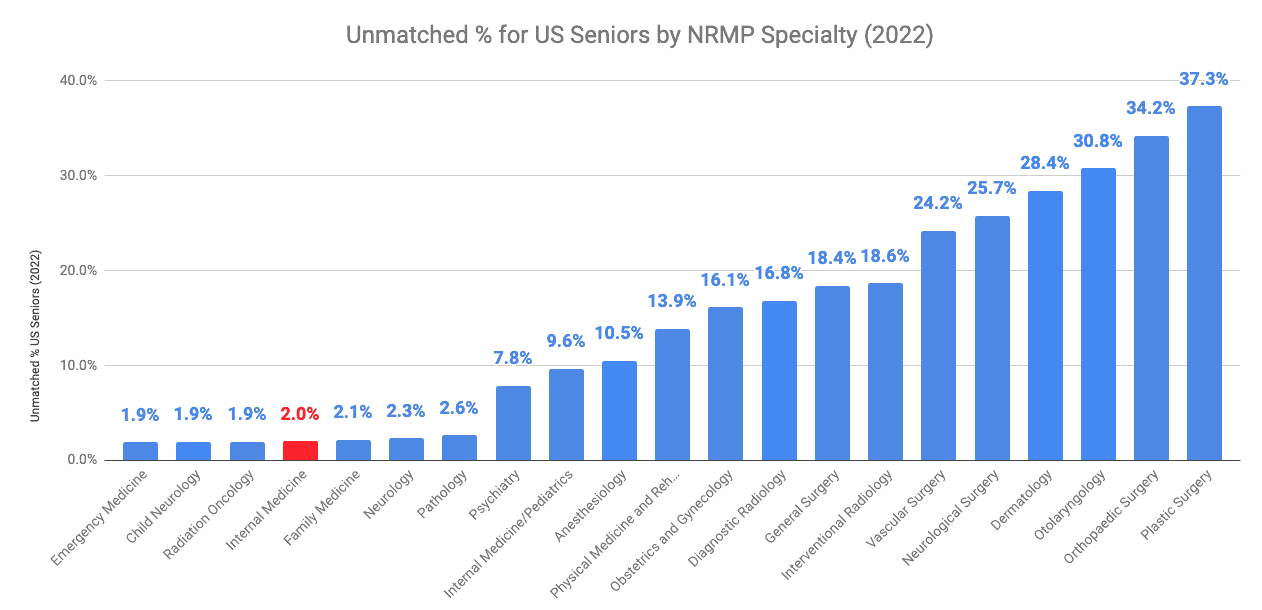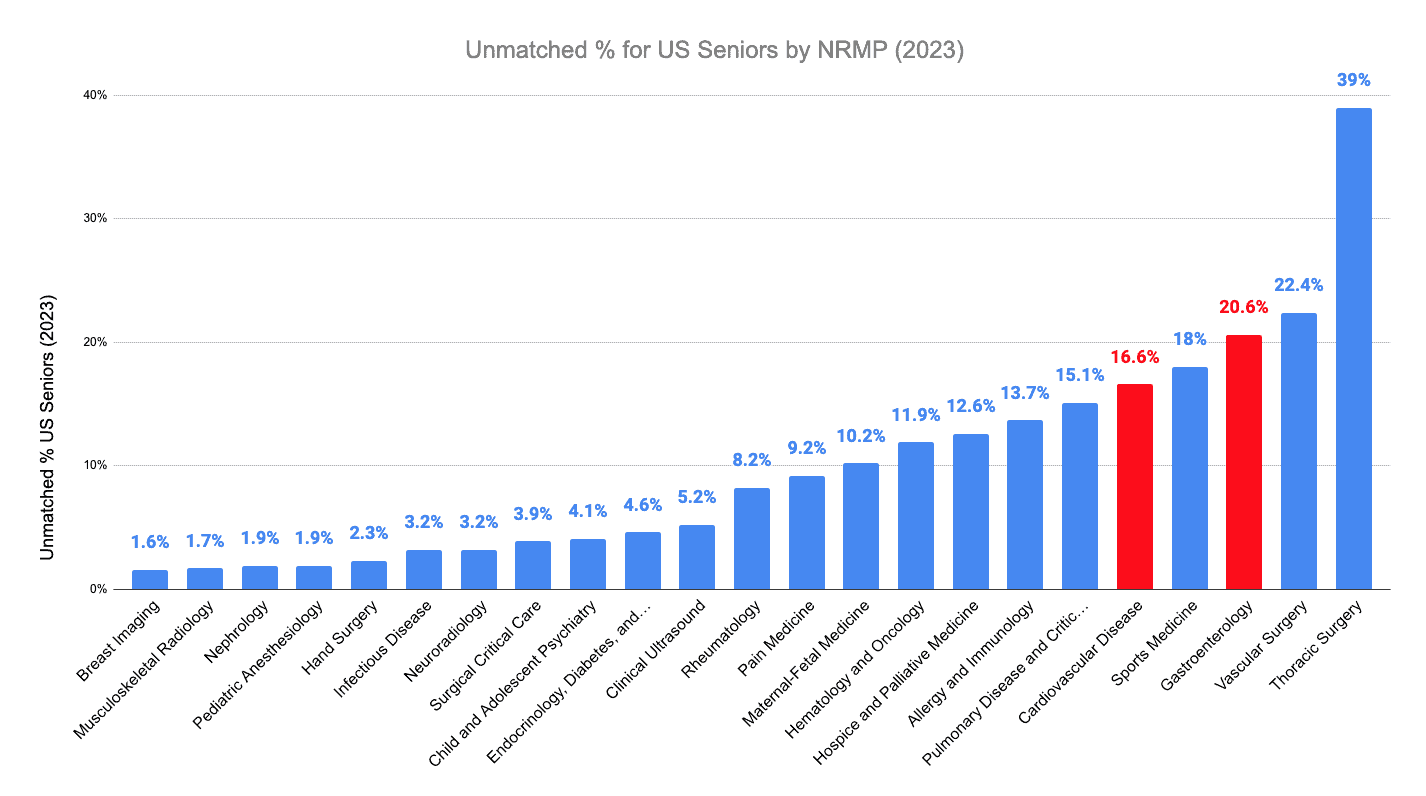
Cardiology vs. gastroenterology is one of the biggest debates among medical students interested in physiology. Both specialties allow you to explore the complex workings of the human body and use your skills to improve patient outcomes. However, they also have significant differences, such as the scope of practice, the work environment, and the training requirements.
How do you decide which one is right for you? In this article, we will provide helpful information and tips to help you make an intelligent decision on cardiology vs. gastroenterology and find a fulfilling career that matches your interests and abilities. We will also help you evaluate practical factors such as job availability, salary, and training duration.
Cardiology vs. Gastroenterology: Salary and Job Security
Cardiology might be your specialty if you want to earn a lot of money and have a steady demand for your services. But be prepared for a competitive job market after fellowship, even if you graduate from a prestigious program. A Harvard-MGH fellow once told me, “I’ll consider myself lucky if I find a job in a city I recognize.”
Gastroenterology, meanwhile, offers more job openings. You can easily find a hospital that needs gastroenterologists, and the career outlook is positive, even if the salary is slightly less than cardiology. But gastroenterology also comes with some challenges, such as higher burnout and less job security, which I will discuss later.
According to recent data, cardiologists earn an average annual salary of $507,000, while gastroenterologists have a slightly lower average salary of $501,000. Of all medical specialties, only orthopedists and plastic surgeons have higher average annual salaries than cardiologists, with orthopedists earning $573,000 and plastic surgeons earning $619,000.
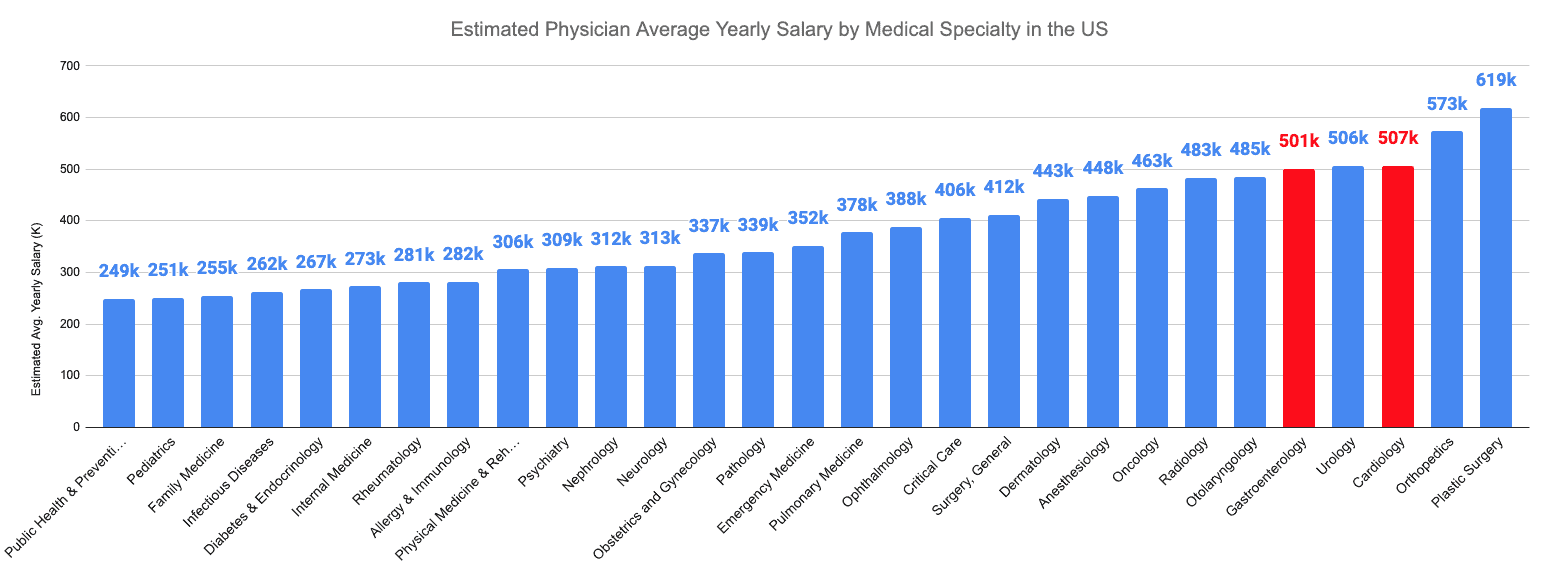
Cardiologists earn $507,000 per year on average, while gastroenterologists earn slightly less with $501,000 annually
Cardiology vs. Gastroenterology: Competitiveness
Here we can assess the competitiveness of a specialty by looking at the unmatched rate – the % of people who apply and do not match into their preferred specialty.
To pursue a career in cardiology or gastroenterology, you must first match into an internal medicine residency. Among US Seniors, the unmatched percentage for internal medicine residency was only 2%, making it less competitive than other residencies. However, this does not mean that cardiology or gastroenterology is less competitive. After completing your internal medicine residency, you will still need to match into a fellowship, which is generally more competitive than matching into a residency.
Below is the unmatched percentage among non-pediatric fellowships with >100 applicants. The unmatched percentage of US Seniors applying to the cardiovascular diseases fellowship was 16.6%, making it highly competitive compared to most fellowships with >100 applicants. Similarly, the unmatched percentage of US seniors applying to gastroenterology was 20.6%, making it highly competitive, even slightly higher than that of cardiovascular diseases.
Training Path: Fellowship vs. Residency
The training pathways for cardiology vs. gastroenterology are similar. Cardiology involves a three-year internal medicine residency and a cardiology fellowship. Gastroenterology also involves a three-year internal medicine residency and gastroenterology fellowship.
A gastroenterology fellowship is generally more competitive than a cardiology fellowship. Your USMLE scores, med school, and research are the main things for residency applications. Research is also a big thing for fellowship applications, and your residency program counts more, but your USMLE scores matter much less.
Cardiology vs. Gastroenterology: Work-Life Balance
Work-life balance is a crucial factor for many medical professionals. Gastroenterologists enjoy a more balanced work schedule with predictable working hours and fewer on-call requirements. However, it’s worth mentioning that this also means gastroenterologists are thought to be more easily replaced, as they don’t typically maintain a panel of patients like their cardiology counterparts.
Cardiology, an often patient-centric specialty, requires building long-lasting patient relationships. While this can be rewarding, it also means carrying a patient panel and more administrative work.
That being said, cardiologists work an average of 56.2 hours/week, ranking third after general surgeons and intensivists who work 57.4 and 57.7 hours, respectively. Gastroenterology ranked in the middle of medical specialties, with an average of 52.3 weekly working hours.
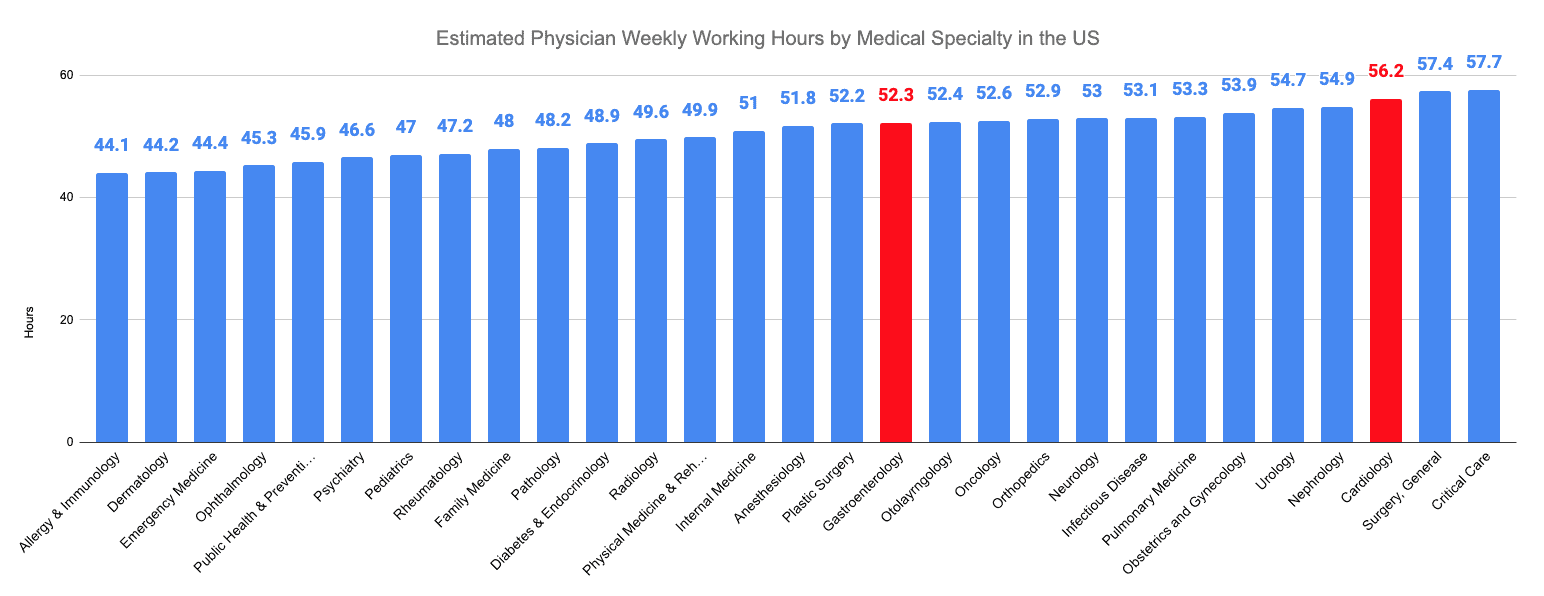
Cardiologists work an average of 56.2 hours per week, while gastroenterologists work slightly fewer hours, at 52.3 per week.
Cardiologists require more documentation, such as referral letters and diagnostic tests, resulting in an estimated 16 hours of admin/paperwork per week, while gastroenterologists have 13 hours.
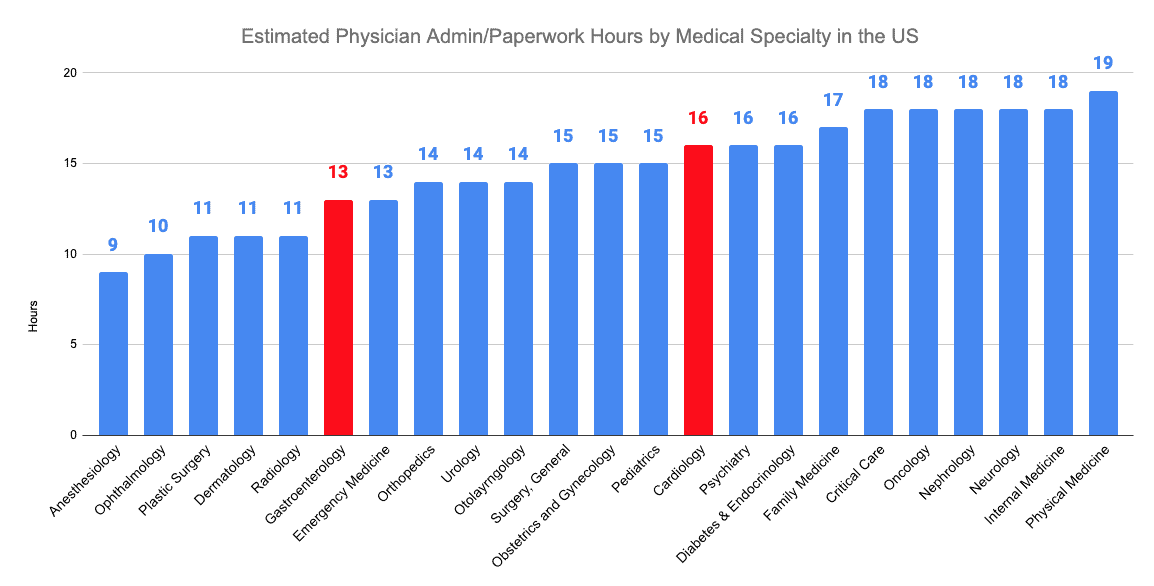
Cardiologist works on admin/paperwork an average of 16 hours per week, while gastroenterologists work fewer hours, at 13 per week.
Training Duration and Subspecialties
The training duration is a key aspect to consider when choosing between cardiology vs. gastroenterology. Gastroenterology has a six-year training period with three years of internal medicine residency followed by a three-year gastroenterology fellowship. Similarly, cardiology has a minimum of six years as well, with three years of internal medicine residency.
However, cardiologists often pursue more subspecialty training in fields like echocardiography or electrophysiology because of the scarce job opportunities. This can increase the length of your cardiology training.
Cardiology vs. Gastroenterology: Job Satisfaction and Burnout Rates
Job satisfaction plays a significant role in career fulfillment. According to various studies, both cardiologists and gastroenterologists tend to have high job satisfaction rates, with many professionals expressing contentment with their career choice and would choose it again if given the chance. However, cardiology has lower reported burnout rates than gastroenterology.
According to recent data, cardiology ranked near the upper end of all medical specialties with 93% of cardiologists stating that they would choose the same specialty again, while gastroenterology ranked slightly lower with 92% of gastroenterologists feeling the same way.
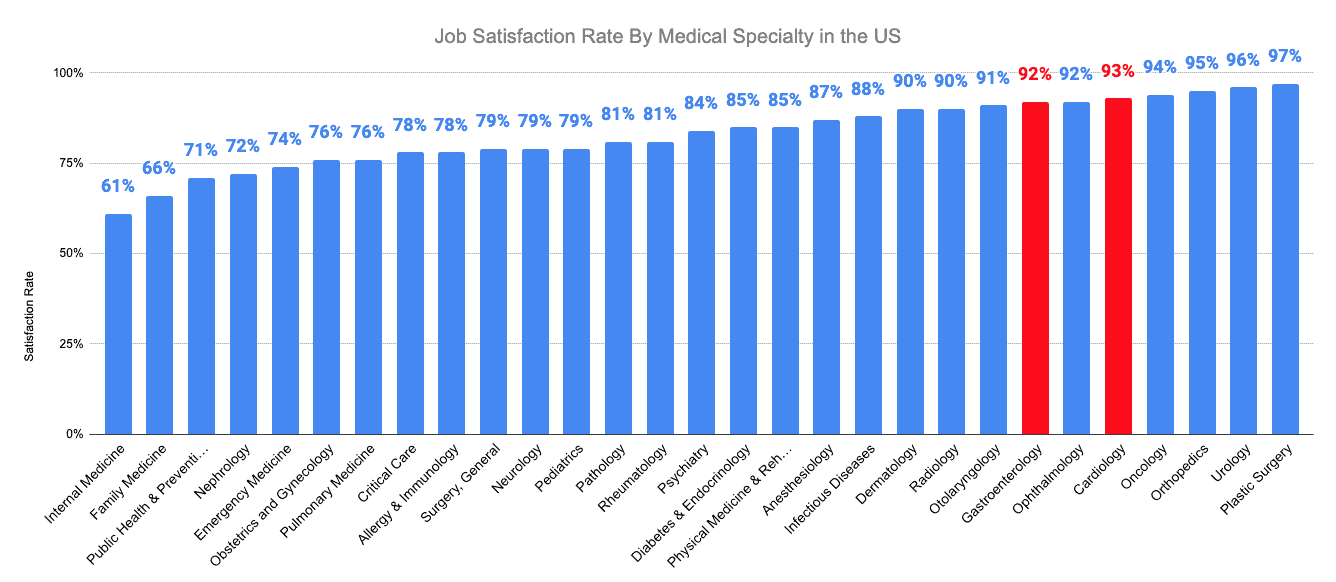
Cardiologists reported a 93% job satisfaction rate, while gastroenterologists reported slightly lower satisfaction with 92%
That being said, the burnout rates for cardiology were 43% which was near the lower end of all medical specialties. In comparison, gastroenterology’s burnout rates were 52% ranking in the middle of all medical specialties.
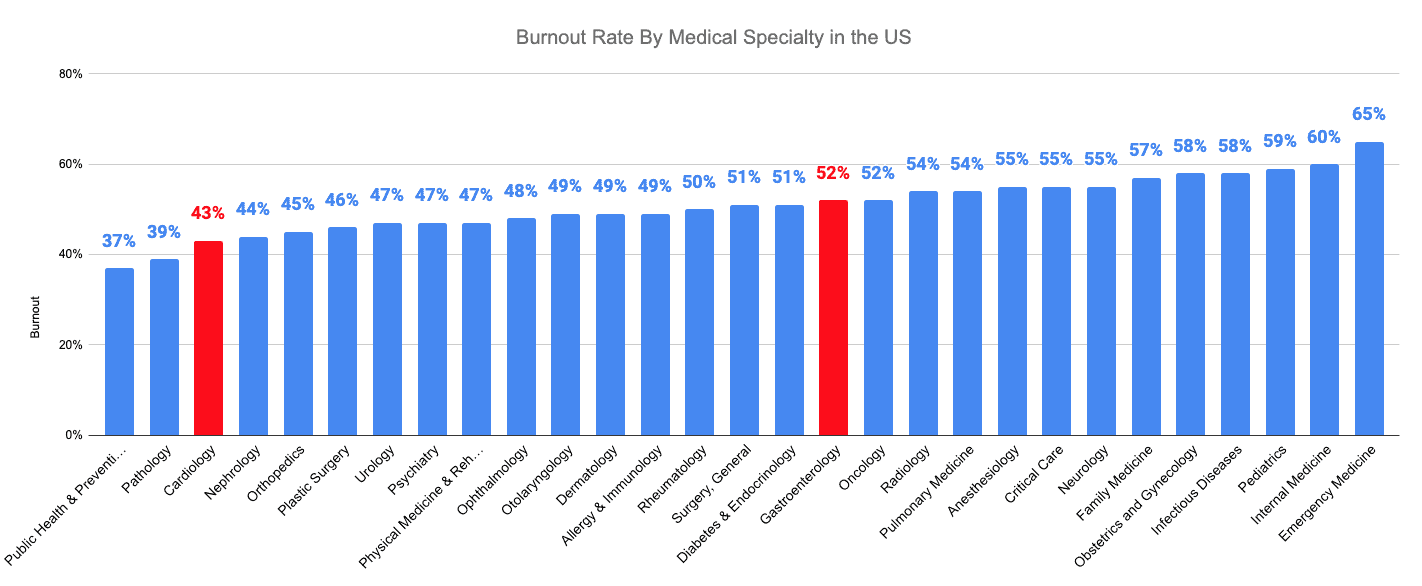
Cardiologists have a burnout rate of 43%, while gastroenterologists have a higher burnout rate of 52%.
Cardiology vs. Gastroenterology Comparison
To provide a visual overview, here’s a table comparing cardiology and :
| Aspect | Cardiology | Gastroenterology |
|---|---|---|
| Average Salary | Generally high income due to specialization, especially in interventional cardiology | Generally high, slightly lower than cardiology |
| Job Security | High demand due to an aging population and the prevalence of cardiovascular diseases | High demand due to the prevalence of gastrointestinal disorders |
| Training Path | Typically involves 3 years of internal medicine residency followed by a 3-year cardiology fellowship | Typically involves 3 years of internal medicine residency followed by a 3-year gastroenterology fellowship |
| Lifestyle | Varied; may involve on-call responsibilities, long working hours, and outpatient clinic duties | Typically more regular working hours, but may also have on-call duties |
| Administrative Paperwork | High documentation requirements such as notes, test orders, and referral letters | Moderate |
| Job Satisfaction | Generally high but can vary with the work environment and patient outcomes | Lower |
| Burnout Rates | Relatively lower | Moderate |
| Personality | Strong analytical skills, attention to detail, ability to handle stress and pressure | Strong communication skills for patient education |
Please note that this table serves as a general comparison. To determine the most suitable career for you, consider your personal and career priorities and goals.
Concluding Thoughts
Choosing the right specialty between cardiology vs. gastroenterology depends heavily on your priorities. To determine this, try reverse engineering your ideal life and identify your top priority. A helpful exercise is to write down the top five things you want to achieve in your career and personal life. Knowing these priorities will make finding a career that aligns with them easier. Often, the biggest obstacle is not a lack of knowledge about different fields but a lack of self-awareness about our own preferences.

